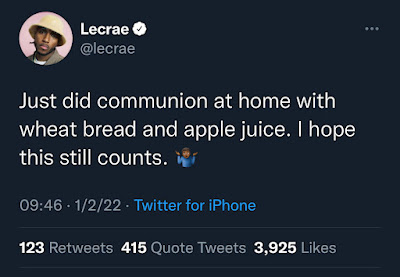I want a church where biblical study is open for everyone to participate, ask questions, disagree, and learn from each other. Discuss what it actually means as a group instead of letting the pastor tell you. This is how scripture was studied when Jesus walked the earth.
I want a church where musical worship is a communal activity. Anyone can play an instrument (bring your own) and everyone sings. Together. Take the attention off the stage and focus on God. This was Paul’s instruction to the church in Ephesus: “Speak to one another with psalms, hymns, and spiritual songs. Sing and make music in your heart to the Lord.” Musical talent shouldn’t matter; after all, the psalms tell us to make a joyful noise, not a pleasant one.
I want a church where dancing is viewed as a method of worship just as King David danced when the arc of the covenant was returned to Jerusalem. Even if it is undignified.
I want a church where grief and mourning are accepted as an act of worship. One psalmist wrote “the sacrifices God desires is a broken spirit and contrite heart.” Elsewhere the poet told us the Lord is close to the broken hearted. I want a church where people can openly and honestly lament without being told to get over it or move on.
I want a church that prioritizes care for the weakest and most vulnerable members of our society. The Bible often instructs its readers to care for orphans, widows, and foreigners - going as far as calling it a religion that is pure and undefiled. From Levitical law, through the gospels, into the New Testament epistles, this is one of the most commonly repeated commands. These verses also include other maligned groups - impoverished people, hired workers, prisoners, homeless individuals, and more. Serving what Jesus called “the least of these” should be of greater value than serving ourselves.
I want a church that embraces social justice. The book of Jeremiah tells us to do justice and righteousness. Deuteronomy tells us those who pervert justice will be cursed. Micah says God requires us to do justice, love kindness, and walk humbly.
I want a church that understands Christianity is not an American thing. We should recognize the oldest church buildings in the world are found in Syria and Egypt and the oldest Christian communities are in Armenia and Ethiopia. Even the first convert into Christianity (according to biblical record) was a man from Ethiopia. God’s covenant is for all people of all nations and there is no biblical basis for thinking America has a privileged relationship with or unique protection from God.
I want a church that isn’t offended when someone says “Black Lives Matter” and isn’t scared to talk about critical race theory. Paul tells us there should be no racial discrimination in the church, declaring both Jewish and Greek people are equal because of Jesus. As long as racism is rampant in America, I want a church that fights for reconciliation, supports minority communities, and amplifies voices of POC leaders.
I want a church that sees the feminine in the divine, not limiting God to exclusive masculinity. Genesis says both male and female were created in God’s image so the personhood of God must be simultaneously male and female.
I want a church that values and promotes women’s rightful place in leadership. God chose a woman to bring the Messiah into the world; Jesus chose women to be the first to preach the gospel; and Paul calls out Pricilla, Julia, Junia, Phoebe, and Chloe as partners in ministry. Women were active in and essential to establishing the early church and they must be allowed the same roles today.
I want a church that affirms the LGBT community. The first Christian convert from Ethiopia was also a eunuch. Such people were considered sexual deviants and were not allowed to enter the temple. If the early church welcomed those rejected by established religious traditions, we should do the same thing today. If all people are created in God’s image, then all bear God’s image regardless of their sexual orientation or gender identity.
I want a church that isn’t afraid of foul language, skeptical attendees, uncomfortable questions, provocative conversations, and taboo topics. I want a church that supports public education, believes in science, protects the health and safety of their communities, and realizes the most qualified people to provide counseling are licensed therapists.
I want a church who takes God’s command to Adam in the creation story seriously – to work the land and take care of it. I want a church who realizes earth’s resources are limited and we must be good stewards of the environment. We cannot continue to strip God’s creation in the name of human progress.
I want a church who calls nationalism, prosperity gospel, and capitalism what they are: idolatry. I want a church that eschews the ideals of consumerism, white supremacy, jingoism, and collection of wealth. I want a church that abandons teachings rooted in colonialism, American exceptionalism, patriarchy, classism, ableism, homophobia, and xenophobia.
I want a church where anyone is safe to express their reservations, their hopes, and their fears. I want a church were anyone regardless of their background, personality, existing beliefs, or economic status can walk through the doors and feel welcomed. When someone says “I have my doubts,” I want a church that says “So do we.”
Photo by Tim Mossholder on Unsplash
Maybe a church like this doesn’t exist. Perhaps this is asking too much. I can dream though.


